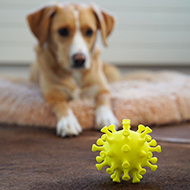Chief vet confirms COVID-19 in pet dog

The dog contracted the disease from its owners who had previously tested positive for COVID-19.
The virus responsive for COVID-19 has been identified in a pet dog, the UK’s chief veterinary officer, Christine Middlemiss, has confirmed.
Tests at the Animal and Plant Health Agency laboratory in Weybridge confirmed the virus on 3 November. The dog is said to be recovering at home.
Defra states that the dog contracted the disease from its owners who had previously tested positive for COVID-19 and there is no evidence to suggest the animal passed the disease to its owners, or that pets can transmit the virus to humans.
CVO Christine Middlemiss said: “Tests conducted by the Animal and Plant Health Agency have confirmed that the virus responsible for Covid-19 has been detected in a pet dog in the UK. The infected dog was undergoing treatment for another unrelated condition and is now recovering.
“It is very rare for dogs to be infected and they will usually only show mild clinical signs and recover within a few days.
“There is no clear evidence to suggest that pets directly transmit the virus to humans. We will continue to monitor this situation closely and will update our guidance to pet owners should the situation change.
“Dr Katherine Russell, Consultant Medical Epidemiologist at UKHSA, said: COVID-19 is predominantly spread from person to person but in some situations, the virus can spread from people to animals. In line with general public health guidance, you should wash your hands regularly, including before and after contact with animals.”



 The latest
The latest